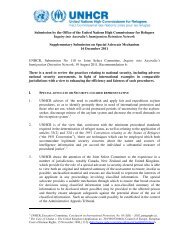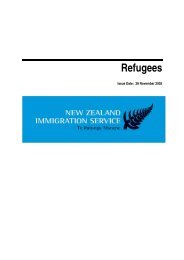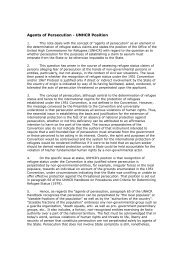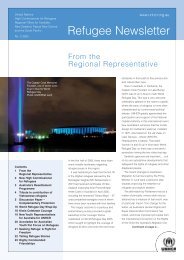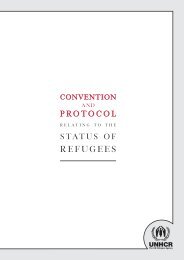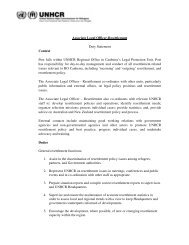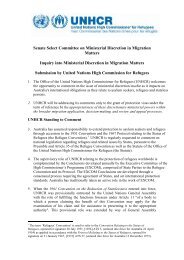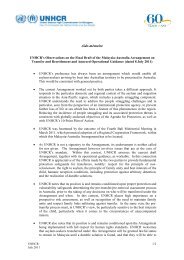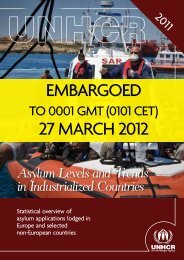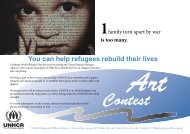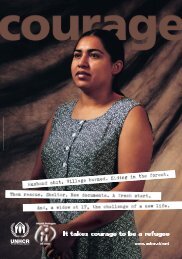Internally Displaced Persons - unhcr
Internally Displaced Persons - unhcr
Internally Displaced Persons - unhcr
You also want an ePaper? Increase the reach of your titles
YUMPU automatically turns print PDFs into web optimized ePapers that Google loves.
GUIDING<br />
PRINCIPLES<br />
& ?<br />
QUESTIONS<br />
ANSWERS<br />
The 14-page booklet, Guiding Principles<br />
on Internal Displacement contains<br />
30 pointers for governments and humanitarian organizations<br />
to help the displaced.<br />
The definition of the internally displaced “are persons<br />
or groups of persons who have been forced or obliged to<br />
flee or to leave their homes or places of habitual residence,<br />
in particular as a result of or in order to avoid the effects of<br />
armed conflict, situations of generalized violence, violations<br />
of human rights or natural or human-made disasters, and<br />
who have not crossed an internationally recognized State<br />
border.”<br />
The 30 principles include:<br />
B Principle 2 (2): These Principles shall not be interpreted as restricting,<br />
modifying or impairing the provisions of any international<br />
human rights or international humanitarian law instrument or rights<br />
granted to persons under domestic law. In particular, these Principles<br />
are without prejudice to the right to seek and enjoy asylum<br />
in other countries.<br />
B Principle 5: All authorities and international actors shall respect<br />
and ensure respect for their obligations under international law,<br />
including human rights and humanitarian law, in all circumstances,<br />
so as to prevent and avoid conditions that might lead to displacement<br />
of persons.<br />
B Principle 6 (1): Every human being shall have the right to be protected<br />
against being arbitrarily displaced from his or her home or<br />
place of habitual residence.<br />
B Principle 15: <strong>Internally</strong> displaced persons have:<br />
a. The right to seek safety in another part of the country;<br />
b. The right to leave their country;<br />
c. The right to seek asylum in another country; and<br />
d. The right to be protected against forcible return to or resettlement<br />
in any place where their life, safety, liberty and/or<br />
health would be at risk.<br />
B Principle 28 (1): Competent authorities have the primary duty<br />
and responsibility to establish conditions, as well as provide the<br />
means, which allow internally displaced persons to return voluntarily,<br />
in safety and with dignity, to their homes or places of habitual<br />
residence, or to resettle voluntarily in another part of the country.<br />
Such authorities shall endeavor to facilitate the reintegration of<br />
returned or resettled internally displaced persons.<br />
B What is UNHCR’s<br />
position vis-à-vis the<br />
internally displaced?<br />
The agency’s mandate specifically covers<br />
refugees, but in the last 30 years it<br />
assisted in around 30 operations involving<br />
IDPs including Colombia, Kosovo and<br />
Afghanistan. It becomes involved only at<br />
the specific request of the Secretary-<br />
General or another appropriate U.N.<br />
authority and with the agreement of<br />
involved nations. It has been careful not to<br />
compromise its refugee mandate and must<br />
work within limited financial and<br />
manpower resources.<br />
B Is there any friction<br />
between the two roles?<br />
The organization’s Statute has been<br />
interpreted flexibly to allow it to work<br />
with IDPs. The most frequent restraints are<br />
lack of security and refusal of access to the<br />
displaced by governments and other<br />
insurgents. There may also be difficulties at<br />
times in helping refugees and IDPs<br />
simultaneously. Programs designed to help<br />
people in situ—IDPs—by their very nature<br />
could complicate asylum procedures. During<br />
the Kosovo conflict, for instance, the former<br />
Yugoslav Republic of Macedonia argued<br />
there was no need to allow displaced<br />
persons to cross a frontier to seek asylum<br />
because they were already receiving aid in<br />
their own country.<br />
INTERNALLY DISPLACED PERSONS • 2004<br />
13



